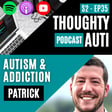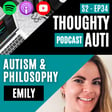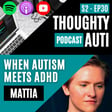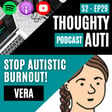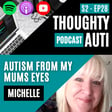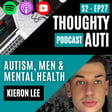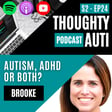
Autism At Christmas - Dealing with High Volume Social Events w/AutisticTyla
How can an autistic person deal with holidays? How can you organise festive periods that suit you? Are there too many expectations during Christmas?
In this episode of the Thoughty Auti Podcast, Thomas talks to Tyla from the @AutisticTyla Instagram page about the difficulties of festive periods and the ways an autistic individual can cope with them.
Tyla is first and foremost a blogger with a passion for building communities and an intent to bring autistic individuals together. She makes content that appeals to young adults on the autistic spectrum and strives to offer important advice for 'adulting' in a confusing world.
We dive into the core issues and mindsets that make Christmas time a painful ordeal, talk about the ways an individual can cope with the expectations put on them, ponder over options for socialising if the company is craved, and finally highlight the key ways Tyla has improved her life.
If you have an exciting or interesting story and want to appear on the next Podcast, please contact me at: aspergersgrowth@gmail.com
Tyla’s Links:-
Instagram - https://www.instagram.com/autistictyla/
▬▬▬▬▬▬▬▬▬▬▬▬▬▬▬▬▬▬▬▬▬▬▬▬▬▬▬▬▬▬▬
Channel Merchandise - https://teespring.com/stores/aspergers-growth
Support via Patreon! - https://www.patreon.com/aspergersgrowth
Social Media ♥ -
☼ Facebook - Aspergers Growth
☼ Twitter/Instagram - @aspergersgrowth
♫ Listen On -
Spotify - https://open.spotify.com/show/6vjXgCB7Q3FwtQ2YqPjnEV
Apple Podcasts - https://podcasts.apple.com/gb/podcast/thoughty-auti-the-autism-mental-health-podcast/id1470689079
Music -
♫ Track: [Chill Music] Ikson - Reverie [No Copyright Music]
Advert Track: Empty Parking Lot - Colours Of Illusion [Epidemic Sound]








